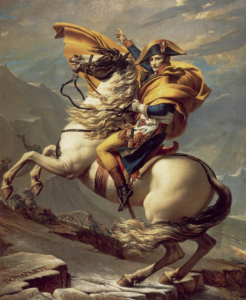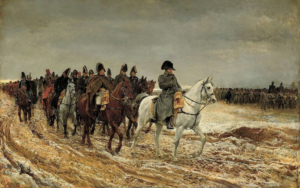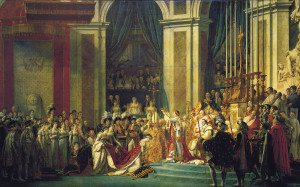Napoléon and the Birth of Modern France
Napoléonic Art
The small island of Corsica lies just below the Mediterranean coast of France but it was long under the sway of the Italian region. After the war with Genoa, the Treaty of Versailles of 1768 ceded the island of Corsica to France, and, as a result, Nabuleone di Buonaparte was born in 1769 was a French citizen. The French embarked on a campaign of what Robert J. Blackwood called in The Gallicisation of Corsica: The Imposition of French Language from 1768 to 1945 (2004) “gallicisation” or turning an Italian island into a French one. After translating his name into its French version, Napoléon Bonaparte, the young military officer was part of the army raised to repel the invasion of France. For Europeans, especially the Austrians, the initial reason for intervening in internal French affairs was the Queen herself who was Austrian and must be rescued. Allies, Austria and Prussia, attempted to invade and end the Revolution before it was too late for Marie Antoinette. However, the first nationwide draft of any country, the levée en masse, in 1793, put large numbers of French men in the field and, in an extraordinary feat, the new Revolutionary government managed to feed, clothe and arm the citizens’ army. Even after the deaths of the King and Queen, the European powers still sought to restore the hereditary right to rule, or, to put it another way, to safeguard the legitimacy of aristocratic power for themselves in their own nations. The fever for Revolution had already infected America, to the great cost of Britain, and this strange and rebellious desire for “equality” must not be allowed to spread to the rest of Europe.
To counter the reactionary European alliance, a young Corsican coporal, Napoléon Bonaparte, rose through the ranks of the French Army by exhibiting his talents with artillery, a relatively modern weapon for modern war. Napoléon was a common man, who, for many, personified the promise of the Revolution—success through merit. Napoléon understood artillery—it could be moved, it could be deployed strategically, and with its flexible firepower, artillery could be the decisive edge for victory. Before he was born, French artillery had been modernized, standardized and, most importantly, lightened by artillery officer and designer, Jean Baptiste Grimbeauval (1715-1789). Like any new soldiers of his generation, Napoléon was trained to deploy these mobile guns and he did so with skill and military genius. Although he had been trained as an artillery officer and under the old regime he was a captain, in the new post-Revolution army he was an unknown and low ranked corporal who made his mark at the Battle of Lodi on the Italian border. A captain at the time, he used the artillery to capture the promontory of L’Eguillette above Toulon, and Napoléon’s role in recapturing the French base from counter-revolutionaries earned him the rank of Brigadier-General in 1793.

Jacques Louis David. Napoléon Crossing the Alps (1801-1805)
Napoléon was the kind of “new man” the Revolution could bring to prominence and his rise to fame was due, not to noble birth, but to sheer excellence in his profession. Throughout Europe in the fired up imaginations of the commoners, Napoléon was not just a new kind of leader; he was a savior. A “man of the people,” he was perceived as bringing the ideals of the Enlightenment to the rest of Europe. For the French, the Corsican colonial brought order out of the chaos of a Revolution gone wrong. Lucky to be stationed outside of France, Napoléon avoided the internal politics of the Revolution. Many French people outside of Paris were anti-Republican and opposed to the reforms promised by the Revolution. The result was decades of rebellion, collectively called “The Vendée,” also known as the “White Terror,” which carried on until 1813. Indeed it was the lingering Royalist spirit that further elevated his reputation. Once peace of the Italian frontier was restored, Napoléon was at loose ends, drifting through Paris, until a Royalist uprising in 1795 brought him back into the center of action when he quickly took command and ended the rebellion against the Republic and restored order.
The idea of a powerful and popular general in the city, made Parisian politicians nervous and Napoléon was sent back to the army in Italy, this time in command. When Napoléon, not yet thirty, handily dispatched the Austrian army, the Parisian government sent him even further from home to Egypt. Those early years of post-monarchy government is referred to as the First Republic, which oversaw the Reign of Terror, was established in 1792. Far from being a “republic,” in the traditional sense, this Republic included the dictatorship of the Jacobins, the Directory, which employed Napoléon, and the Consulate. Napoléon became the First Counsel in 1799, when he staged a coup d’état, in a typical act of bravado, after being soundly defeated by the British in Egypt. This seizure of power is referred to as “The 18 Brumarie,” after the day and month of the coup. Napoléon’s victories over victories over the enemies of France left only Great Britain in the field and the British, wanting to pursue their own industrial and imperial goals, signed the Peace of Amiens in 1801.
Jacques Louis David. Consecration of the Emperor Napoleon I and Coronation of the Empress Josephine
in the Cathedral of Notre-Dame de Paris on 2 December 1804 (1805-7)
To the English, it was clear that the radical aspects of the French Revolution had evaporated under the conservative control of Napoléon. Indeed the First Republic ended and Napoléon was in total control by 1804, when, dashing the hopes for democracy of European intellectuals from Beethoven to Goya, Napoléon crowned himself Emperor of France and crowned his wife, Josephine, Empress for good measure. The French Revolution was over, the experiment in representative government was ended, and dictatorial power was restored. Napoléon invited the émigrés, who had fled for their aristocratic lives to England and America, to come back to France. He reinstated the Catholic Church, but its property was not restored. Then he embarked upon a campaign of conquest throughout Europe that would stall the benefits of modern life and the Enlightenment in France and for the rest of Europe for decades to come.
Under the guise of being a liberator and a bringer of the ideals of the Revolution, Napoléon conquered the Continent. The longstanding problem of the French debt was solved simply: by looting Europe. While many liberals welcomed the weakening of European monarchies, they were soon disillusioned by Napoléon’s iron grip on his “allies” and became the conquered peoples became restive. Only England, newly alarmed, stood alone, against the French. The resistance of Great Britain only made the nation stronger, while the need to control Napoléon’s conquests eventually drained the French of blood and treasure and the new nation eventually tasted defeat in 1814. The downward spiral began with the ill-conceived invasion of Russia, where the French conquered and occupied Moscow, but were brought low by the Russian winter. Fighting a guerrilla war, also used against the French in Spain and Portugal, the Russians decimated the French army with a scorched earth mode of hit and run warfare. Napoléon prudently but dishonorably abandoned the doomed army and retreated to the safety of the German states with the Prussian and Austrians wings of his army largely intact. Having no clear idea that the defeat in Russia was actually his death-knell, Napoléon returned to France to raise another army only to face an angry and rebellious Germany, Austria was now neutral but opposed to him and another enemy in the Swedes. Intent on regaining his former power and status, the Emperor decided to attack Germany to restore his dominance and his reputation. Describing Napoléon’s Last Campaign in Germany, historian Francis Loraine Petre O.B.E wrote, “The Emperor’s task, looking to the tremendous sacrifices he had already required from France and his allies, was Herculean, but he faced it undauntedly, and his success in conjuring up, as if by magic, a fresh army is perhaps one of his most remarkable achievements.”
 Ernset Meissionier. The French Campaign, 1814 (1864)
Ernset Meissionier. The French Campaign, 1814 (1864)
This large but inexperienced French army with a command divided among marshals who disagreed with their leader. Although he was able to fight effectively if not always victoriously in Germany, Napoléon decided, despite the objections of his lieutenants, to retreat from Germany and to consolidate beyond the Elbe. But he had to face the joint forces of the Russians, the Prussians, the Austrians and the Swedes at the Battle of Leipzig, also known as the Battle of Nations. This enormous battle in October of 1813 was fought over a three day period. in the face of such a large force, Napoléon was defeated and retreated from Germany. Munro Price wrote of the end of Napoléon’s domination of Europe in his book, Napoleon: The End of Glory: “The retreat from Leipzig was a ghastly trial for the French army. Given the need to outstrip the victorious allies, it was conducted by forced marches. Unable to keep up with the pace, thousands dropped by the wayside. Advancing in their wake, their pursuers found the woods on each side of the main road filled with dead and dying stragglers, and abandoned wagons and cannon everywhere. The scenes was not as terrible as the retreat from Moscow, but it carried unmistakable echoes of that calamity.” To the West, the British had pushed the French out of Spain and Wellington invaded France. Napoléon was now caught in a pincher between two powers. After the Battle of the nations his opponents tried to arrange a peace which would have resulted in his relinquishing conquered territories but in retaining the “natural limits” or geographical borders of Revolutionary France, but Napoléon could not accept negotiations. The result was a massive invasion of France, now a nation of exhausted people who wanted nothing but peace, and a final and decisive defeat of the Little Corporal. He was sent away to exile on the island of Elba where he was allowed to rule and retain the title of “Emperor.”
Napoléon had invented the dark side of modern life—total war—devastating anyone in his path and it was perhaps too much to expect a defiant former Emperor in his forties, presumably at his prime to subside into a quiet life on a remote island and in February of 1185, he managed to escape and return triumphantly to France to a delirious welcome. For the next One Hundred Days, Napoléon revisited the glory of the old days. Napoléon and his total war was an attempt to return to the glory days of the Carolingian Empire which allowed England to become the dominant industrial and military power while he was consolidating his power. The Code Napoléon turned back the reforms and the ideals of the Revolution, abolishing equality but acknowledged the power of the middle class and the principle of merit as a condition of advancement in the military and the government. Most importantly, following the years of upheaval, the Code spelled out the winners and losers. Slavery was reinstated in the colonies. Women were disempowered and the lower classes were put back in their place and the revolutionary energies were drained by the total war that dominated the decade. Thus, the real losers of the French Revolution were the very class that had led the Revolution—the lower classes.
Unwittingly the proletariat had done the dirty business of eliminating the troublesome aristocrats for the bourgeoisie. The sans-coulottes had demonstrated their lack of judgment in following unqualified rabble-rousers. The lower classes had never supported the Enlightenment ideals that had so inspired the upper classes, and, the proletariat and the peasants were unwittingly responsible for the end of the Enlightenment itself. The horrors of the Terror demonstrated the futility of relying upon the powers of human reason and rational thinking. The American Revolution had been eminently rational; the French Revolution had been strikingly irrational. The English Royalists in America were allowed to leave or adapt; the French aristocrats had been massacred in public spectacles in town squares all over the country. In America, the lower classes could aspire to social mobility. The lower classes had terrified their fellow French citizens by acting out centuries of rage, earning the disqualifying sobriquet: “The Dangerous Class.”
Although leading the way to Revolution, the bloodthirsty lower classes were safely distanced from power. The middle-class feared and loathed the undisciplined and unwashed mob and would view any move on the part of the lower classes to protest their status with suspicion and oppression. By behaving less badly, the middle class inherited France and moved into the court of Napoléon, newly empowered under the Empire. The proletariat would have to endure other Revolutions and wait for the century to end before they too would become fully enfranchised. The lower classes, who were promised “liberty, equality, and fraternity,” but got little of the “natural rights” that had been promised. At the end of the Napoléonic wars, one in three lower class men had died, sacrificed for the glory of the nation. The levée en masse created the modern idea of a national army, staffed by proud citizens rather than by mercenaries. In an age when the idea of a “modern nation” was still being developed and in a time when many people in France did not speak official French, the Grand Armée was a unifying force for nationhood.
Under the leadership of Napoléon, after decades of unrest, France was unified against the rest of Europe. Despite the fact that the nation was eventually defeated in 1814 and Napoléon abdicated and went into exile. Ironically, the opposition to the upstart French Emperor also unified European states into modern nation states. Over these years of Revolution and Glory and Defeat, out of the strife and struggle, the modern French Citizen was constructed and the modern French identity came into being within a modern nation state. But there was a cost. The French lost their burgeoning international empire, and England emerged suddenly dominant in Europe. France became a defeated and diminished power, destined to yearn for those years of patriotic glory under Napoléon.
If you have found this material useful, please give credit to
Dr. Jeanne S. M. Willette and Art History Unstuffed. Thank you.
[email protected]
